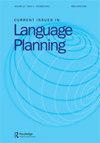Language, hospitality, and internationalisation: exploring university life with the ethical and political acts of university administrators
IF 1.8
1区 文学
Q2 EDUCATION & EDUCATIONAL RESEARCH
引用次数: 1
Abstract
ABSTRACT Drawing on the ethico-political framework of hospitality, this paper investigates the communicative practices of three administrative support staff as they attempt to manage the twin challenges of working in adherence to state and institutional language policies while communicating ethically in an internationalising workplace. Academic administrative staff rarely feature in studies on internationalisation yet are crucial to understanding the complex day-to-day realities of contemporary university life. Empirically, this study reports on 18 months of ethnographic fieldwork, including observations, interviews, and email records. The data demonstrate language work being carried out on an ethical basis, before the consideration of any particular languages, beyond the participants’ political obligations, and in excess of institutional support. The current national and institutional responses to the multilingual realities of Swedish university life, I argue, are failing to do justice to and facilitate the ethically grounded, bottom-up language policy-making as practised by this study’s participants. This paper thus promises to open up debate on hospitality within language policy and planning for internationalising Higher Education, and, in its re-evaluation of the ethical and political dimensions of hospitality, it emphasises the framework’s critical potential within sociolinguistic research, more generally.语言、热情好客和国际化:用大学管理者的道德和政治行为探索大学生活
摘要本文以好客的伦理政治框架为基础,调查了三名行政支持人员的沟通实践,他们试图在国际化的工作场所进行合乎道德的沟通,同时应对遵守国家和机构语言政策的双重挑战。学术管理人员很少出现在国际化研究中,但对于理解当代大学生活的复杂日常现实至关重要。根据经验,本研究报告了18个月的民族志实地调查,包括观察、访谈和电子邮件记录。数据表明,语言工作是在考虑任何特定语言之前,在道德基础上进行的,超出了参与者的政治义务,超出了机构支持。我认为,目前国家和机构对瑞典大学生活中多语言现实的反应,未能公正地对待和促进本研究参与者所采取的基于道德、自下而上的语言政策制定。因此,本文承诺在语言政策和高等教育国际化规划中展开关于好客的辩论,并在对好客的伦理和政治层面的重新评估中,更广泛地强调了该框架在社会语言学研究中的关键潜力。
本文章由计算机程序翻译,如有差异,请以英文原文为准。
求助全文
约1分钟内获得全文
求助全文
来源期刊

Current Issues in Language Planning
Multiple-
CiteScore
4.80
自引率
16.70%
发文量
26
期刊介绍:
The journal Current Issues in Language Planning provides major summative and thematic review studies spanning and focusing the disparate language policy and language planning literature related to: 1) polities and language planning and 2) issues in language planning. The journal publishes four issues per year, two on each subject area. The polity issues describe language policy and planning in various countries/regions/areas around the world, while the issues numbers are thematically based. The Current Issues in Language Planning does not normally accept individual studies falling outside this polity and thematic approach. Polity studies and thematic issues" papers in this journal may be self-nominated or invited contributions from acknowledged experts in the field.
 求助内容:
求助内容: 应助结果提醒方式:
应助结果提醒方式:


